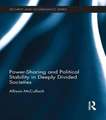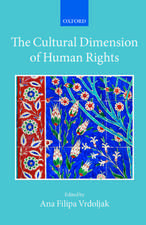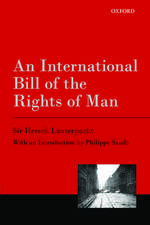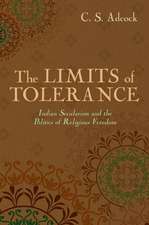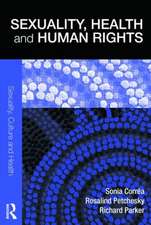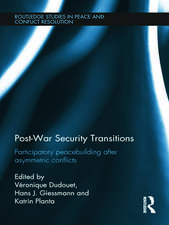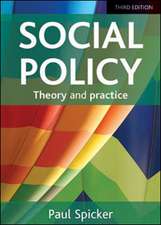Truth Commissions and Transitional Societies: The Impact on Human Rights and Democracy: Security and Governance
Autor Eric Wiebelhaus-Brahmen Limba Engleză Paperback – 7 dec 2009
Providing the first cross-national analysis of the impact of truth commissions and presenting detailed analytical case studies on South Africa, El Salvador, Chile, and Uganda, author Eric Wiebelhaus-Brahm examines how truth commission investigations and their final reports have shaped the respective societies. The author demonstrates that in the longer term, truth commissions have often had appreciable effects on human rights, but more limited impact in terms of democratic development. The book concludes by considering how future research can build upon these findings to provide policymakers with strong recommendations on whether and how a truth commission is likely to help fragile post-conflict societies.
This book will be of interest to students and scholars of Transition Justice, Human Rights, Peace and Conflict Studies, Democratization Studies, International Law and International Relations.
| Toate formatele și edițiile | Preț | Express |
|---|---|---|
| Paperback (1) | 432.34 lei 6-8 săpt. | |
| Taylor & Francis – 7 dec 2009 | 432.34 lei 6-8 săpt. | |
| Hardback (1) | 1056.28 lei 6-8 săpt. | |
| Taylor & Francis – 4 ian 2010 | 1056.28 lei 6-8 săpt. |
Preț: 432.34 lei
Nou
Puncte Express: 649
Preț estimativ în valută:
82.72€ • 86.38$ • 68.31£
82.72€ • 86.38$ • 68.31£
Carte tipărită la comandă
Livrare economică 15-29 aprilie
Preluare comenzi: 021 569.72.76
Specificații
ISBN-13: 9780415553223
ISBN-10: 0415553229
Pagini: 240
Ilustrații: 12 tables
Dimensiuni: 156 x 234 x 13 mm
Greutate: 0.36 kg
Ediția:1
Editura: Taylor & Francis
Colecția Routledge
Seria Security and Governance
Locul publicării:Oxford, United Kingdom
ISBN-10: 0415553229
Pagini: 240
Ilustrații: 12 tables
Dimensiuni: 156 x 234 x 13 mm
Greutate: 0.36 kg
Ediția:1
Editura: Taylor & Francis
Colecția Routledge
Seria Security and Governance
Locul publicării:Oxford, United Kingdom
Public țintă
Postgraduate and UndergraduateCuprins
Part 1: Truth-Seeking as an Article of Faith 1. An Inconvenient Truth 2. Theorizing Truth Commission Expectations Part 2: Experiments in Truth 3. South Africa’s Paradigmatic Truth and Reconciliation Commission 4. Chile’s Persistent Past 5. Truth and Peacebuilding in El Salvador 6. Historical Oblivion in Uganda Part 3: Truth Commissions in Cross-National Context 7. Truth Commissions, Human Rights, and Democracy Around the World Part 4: The Promise and Pitfalls of Truth Commissions 8. The Consequences of Truth
Recenzii
This ground-breaking study of truth commissions is essential reading for anyone interested in taking stock of one of the most common measures of transitional justice. Its mixture of qualitative case studies and quantitative analysis offers new rigor to the assessment of truth commissions. His findings, that truth commissions have negative effects on human rights in the near term, and negligible impact on democratization, should be carefully considered by practitioners and scholars of transitional justice. - Professor Chandra Lekha Sriram, Chair in Human Rights and Director, Centre on Human Rights in Conflict, School of Law, University of East London, UK
Eric Wiebelhaus-Brahm thoughtfully highlights the difficulties inherent in assessing the impact of truth commissions and challenges us to re-think current approaches to evaluating their work. - Catherine Jenkins – School of Oriental and African studies, University of London, UK
In recent decades, truth commissions have been widely promoted as a basis for furthering human rights, reconciliation, and democratic change. What have these institutions accomplished, and under what circumstances do they contribute to these goals? Eric Wiebelhaus-Brahm's impressive new book addresses these questions through a series of carefully designed case studies. His findings challenge many of the assumptions that animate theoretical and policy debates on truth commissions, while providing an illuminating look at the difficulties associated with investigating past abuses in a context of political change. This book should be required reading for those interested in truth commissions and transitional justice. - Bronwyn Leebaw, Department of Political Science, University of California, USA
Wiebelhaus-Brahm’s (2010) book provides the most extensive examination of truth commissions to date using a mixed-methods approach. - James D. Meernik, Angela Nichols and Kimi L. King, "The Impact of International Tribunals and Domestic Trials on Peace and Human Rights After Civil War" International Studies Perspectives. 11(3).
Eric Wiebelhaus-Brahm thoughtfully highlights the difficulties inherent in assessing the impact of truth commissions and challenges us to re-think current approaches to evaluating their work. - Catherine Jenkins – School of Oriental and African studies, University of London, UK
In recent decades, truth commissions have been widely promoted as a basis for furthering human rights, reconciliation, and democratic change. What have these institutions accomplished, and under what circumstances do they contribute to these goals? Eric Wiebelhaus-Brahm's impressive new book addresses these questions through a series of carefully designed case studies. His findings challenge many of the assumptions that animate theoretical and policy debates on truth commissions, while providing an illuminating look at the difficulties associated with investigating past abuses in a context of political change. This book should be required reading for those interested in truth commissions and transitional justice. - Bronwyn Leebaw, Department of Political Science, University of California, USA
Wiebelhaus-Brahm’s (2010) book provides the most extensive examination of truth commissions to date using a mixed-methods approach. - James D. Meernik, Angela Nichols and Kimi L. King, "The Impact of International Tribunals and Domestic Trials on Peace and Human Rights After Civil War" International Studies Perspectives. 11(3).
Descriere
This book uses a multi-method approach to examine the impact of truth commissions on subsequent human rights protection and democratic practice and features cross-national case studies on South Africa, El Salvador, Chile and Uganda.

















